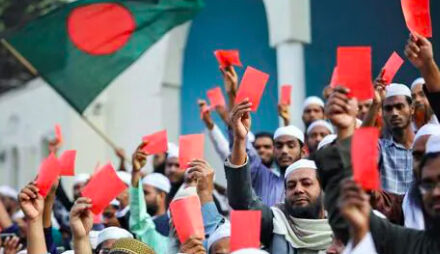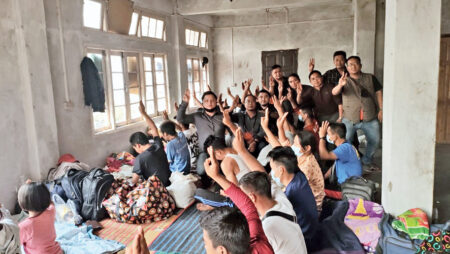MANTRAYA BRIEF#12: 04 January 2016
Bangladesh’s Ansarullah Bangla Team
Surya Valliappan Krishna
–
Abstract
Ansarullah Bangla Team (ABT) has emerged as a radical Islamist group with a limited operational objective of targeting secular bloggers in Bangladesh. However, behind its attacks on and killings of these bloggers, is its larger intent of establishing Islamic rule in the country and being part of the global jihad.
–
Ansarullah Bangla Team (ABT) emerged first as Jama’atul Muslemin in 2007. Until 2013, the group was believed to be extinct, before its re-emergence as the ABT. The group effectively uses the online medium to promote extremist ideas and messages from al-Qaeda preachers such as late Anwar al-Awlaki with an objective of radicalising Bangladeshi youth and encourage their participation in local Jihad.
The leader of ABT, Mufti Jasimuddin Rahmani, was arrested on 12 August 2013 along with 30 members of the outfit from the southern Barguna district for inciting people to commit violent Jihad. On 25 May 2015, the group was banned under anti terrorism laws. Unfazed by the ban, the ABT issued death threats to more than 10 individuals since including the Junior Minister for Home Affairs, Asaduzzam Khan Kamal. In September 2015, acting chief of ABT, Muhammed Abul Bashar was arrested along with two other ABT cadres. The Rapid Action Battalion (RAB) sources in Bangladesh said that Bashar was attempting to flee the country.
The group is famously known for its targeting of secular bloggers in Bangladesh since 2013. In February 2013, ABT activists hacked to death Ahmed Rajib Haider, a secular blogger. Haldar had organised the ‘Shahbagh youth protest’, demanding maximum penalty for the 1971 war criminals. ABT’s subsequent targets included five persons. US citizen Avijit Roy was the founder of the atheist website Mukto Mona. On 26 February 2015, as he was returning from a book fair in capital Dhaka, he was pulled from a rickshaw and killed. Washiqur Rahman was a blogger known for his atheist views; on 30 March 2015 he was hacked to death near his home in Dhaka. Ananta Bijoy Das, a banker who wrote blogs for the Mukto Mona website run by Avijit, was attacked and hacked to death by masked ABT cadres on 12 May 2015 in north eastern Sylhet city. Niloy Chakrabarti (who wrote under the pen name Niloy Neel) and publisher Faisal Arefin Dipan, who published a bestselling book by Avijit Roy were killed in Dhaka in August and October 2015 respectively. In 2015, Rahmani had ordered the murders of the bloggers from his jail cell, a message that Bashar had taken to the outfit’s followers, the RAB sources have said. On 31 December 2015, two former private university students- Md Faisal Bin Nayem alias Dweep and absconding Redwanul Azad Rana were sentenced to death by a court for killing Ahmed Rajib Haider. The court also found Mufti Jasim Uddin Rahmani and five others guilty. Rahmani was given five years of jail and Taka 2,000 in fine with two months of additional imprisonment in default.
Several other bloggers were put in the hit list published by the group online on 23 September 2015. The list included nine persons based in the UK, seven in Germany, two in the United States, one each in Canada and Sweden. The ABT called for cancellation of their Bangladeshi citizenship as they are “enemies of Islam and [Muslim religious] education, atheists, apostates, unbelievers, anti-Islamic bloggers, and agents of India.” The ABT clearly said that these bloggers “will be killed wherever they can be found in the Almighty’s world”.
The killings of the bloggers in Bangladesh not only defined the ABT as a brutal force of intolerance but also gathered support for the upholding of personal views and rights with the social media community particularly playing vanguards of the secular atheist blogging community. However, at the same time, the government in Bangladesh curiously asked the bloggers to ‘limit’ their writings as not to affect the religious sentiments of the people.
The ABT, due to its proximity with the Ansar ul-Islam, is believed to have linkages with the al-Qaeda. Ansar ul-Islam, formed by the followers of an Afghan Sufi preacher, Pir Saifur Rehman in 2004 to counter the Lashkar-e-Islam formed by Mufti Munir Shakir, a hard-line Sunni cleric who opposes Sufism, is one of the most violent factions of Pakistani Taliban and is part of the al-Qaeda network. While Rehman preached Brelvi Islam inspired by Sufism, Shakir advocated puritanical Deobandi Islam. The five ABT members who were arrested in March 2013 for murder of Ahmed Rajib Haider were praised on the al-Qaeda affiliated Ansar al-Mujahideen media website as ‘five lions of the Ummah’. ABT translates al-Qaeda’s works in to Bengali for their local audience.
Educated youth belonging to the madrassas and other academic institutions remain ABT’s target for recruitment. ABT comprises of a group of tech-savy men who keep abreast of atheist writing and select targets, as well a group of foot soldiers who are willing to carry out violent attacks on people they believe violate religious norms. Touhidur Rahman, one of the men arrested for the attack on bloggers Avijit Roy and Anantha Bijoy Das was a British National of Bangladeshi origin. He claimed that upon his return to Bangladesh in 2012 he was inspired by the ABT and monitored the movements of the blogging community. Investigations revealed that the two men who murdered Washiqur Rahman and were arrested in March 2015 had never read his blog but nevertheless killed him for his writing. While unverifiable reports point at training imparted to some of the ABT members by the al-Qaeda members from Pakistan, the ABT’s wherewithal appears to have been augmented by the militants belonging to pro-al-Qaeda groups such as the outlawed Jama’atul Mujahideen Bangladesh (JMB) and Harkat-ul-jihad-al-Islami (HUJI) joining the outfit.
The rhetoric of ABT isn’t drastically different from the radical Islamist groups around the world. The group openly labels democracy as anti-Islam and has even published a documentary titled ‘Eradicate Democracy’ which interprets democracy as being in direct conflict with Islamic principles. It further characterises political leaders as the main roots of all evil like murder and rape and exhorts people to “come out of the system and adopt jihad to free themselves from the social evils”. Terming a number of bloggers as anti-Islamic, the group calls them apostates and agents of India. Religious radicalism isn’t new to Bangladesh. However unlike the previous groups, the ABT focuses on selected targeting rather than mass attacks.
–
(Surya Valliappan Krishna is a project intern at Mantraya. A special mention to Ipshita Chakrabarti for helping out with Bengali translations. This brief has been published under Mantraya.org’s Mapping Terror & Insurgent Networks project.)


